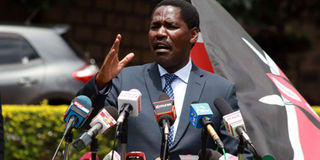Agriculture the next frontier, and we have a chance to take the lead

Agriculture Cabinet Secretary Peter Munya launches coffee revitalisation projects, at Kilimo House, Nairobi, on April 20, 2020. PHOTO | DENNIS ONSONGO | NATION MEDIA GROUP
What you need to know:
- Our agricultural production has continued to dwindle, largely due lack of policy guidelines and research to sustain the sector as the country’s economic bedrock.
- Kenya has set in motion what is the beginning of an agrarian revolution. To create jobs and grow the economy, we must industrialise.
Food has no substitute. That is why, amid the increased government restrictions on movement in a bid to curb the spread of Covid-19, agriculture was listed as an essential service whose value chain remains moving — albeit within directed and, where necessary, authorised parameters.
But two months after the Agriculture Sector Network (Asnet) was formed, the country faces a daunting challenge of keeping the food systems going as unprecedented disruptions by the coronavirus pandemic threaten farming.
It is no wonder, then, that Agriculture Cabinet Secretary Peter Munya recently announced plans to import maize. But the mention of maize imports often stirs up mixed emotions.
As profiteers see multibillion-shilling opportunities in them, farmers dread poor prices and consumers lament costly flour.
Kenya is endowed with sufficient water, land and a good climate for growing a wide variety of crops for food and other uses.
Unfortunately, 50 years after independence, our agricultural production has continued to dwindle, largely due lack of policy guidelines and research to sustain the sector as the country’s economic bedrock.
The sinking of agriculture has led to a corresponding decline in job creation and food security. Talk of double trouble.
DISTRIBUTION SYSTEM
Covid-19 puts food security at the top of the pandemic management agenda, neck and neck with provision of health guidelines.
Without easy flow of imports, maintaining the supply chain is a delicate balance.
That the import route is not taking the usual pattern due to closure of borders and international transport restrictions should force us to tap our in-house capacity to fill the granary.
Increased production requires that we set up a post-harvest infrastructure that entails long-term grain storage facilities, processing, distribution and reserves.
Farmers should never have surplus that goes to waste or miss payment for produce. But the irony of our agricultural production is its inability to create a distribution system that is in tandem with the growing zones and harnessing the potential of each to feed the other to maximise production.
We should have systems which move products evenly across the country. Prices can remain constant if we stored produce during harvest to continuously release it into the market without shortages.
Certain popular foods, such as green grams, can be included in the strategic grain reserves to greatly change farmers’ fortunes and help to attain food security.
IMPROVED POLICIES
Covid-19 should serve as a wake-up call to policymakers and agriculture sector players to join hands with Asnet in turning farms into agribusiness units.
Domiciled at the Kenya Private Sector Alliance, Asnet has drawn up a 10-point summary of what we can do in the next decade to transform the agricultural sector into the base of our industrial development.
But the uncertainty brought about by the pandemic requires that we shorten the forecast by reducing imports and harnessing our great production potential.
We have the solutions to hurdles such as inadequate budgetary allocation, dearth of agricultural credit, the effects of climate change, lack of markets and trading in raw materials — if only we took action.
Kenya has set in motion what is the beginning of an agrarian revolution. To create jobs and grow the economy, we must industrialise.
And the foundation of this is availability of raw materials. Our leading exports are agricultural.
But as the global demand for food grows at an encouraging speed, we are losing agricultural land to human settlement and desertification. We have to feed more people from smaller lands.
The Covid-19 food deficit action should flag off a movement that will shape how we do agriculture.
Instructively, countries that are endowed with agricultural land and good climate stand to be the next most important globally. Let us seize the moment.
Mr Njuki, Governor of Tharaka-Nithi County, chairs the Agriculture committee in the Council of Governors (CoG).





